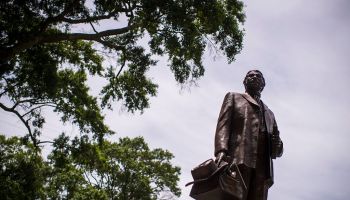A Chicago-based education nonprofit is getting a lot of attention for its identity-based curriculum. In addition to academics, it teaches students of color from a low-income community to embrace their identity and to pilot their lives toward success.
Marie Dandie and Jacob Allen co-founded PilotEd, which launched in 2013 as an after-school program. Allen, who serves as CEO, expects to complete the transformation into a charter school in September 2017, after three years of successful growth. The campus, located in the Englewood neighborhood on Chicago’s South Side, will also continue to serve as a community hub.
Allen told NewsOne he and Dandie created an identity curriculum to help their inner-city students manage a range of issues and challenges in their lives, which kids from middle-class and affluent neighborhoods seldom encounter.
“As African-Americans, many of us have the common experiences of family members incarcerated and living in poverty,” he said. “But none of those things were discussed in the classroom when Marie and I were in school. And when we started teaching in Chicago public schools, there were no discussions about traumatic events like shooting — no grief counseling.”
Their identity curriculum intersects with standard curriculum, to create lessons that the students can relate to, such as mapping out the number of gangs in their neighborhood, or comparing the chemical elements in blond hair to curly black hair. Students also read books with characters who look like them.
That approach to education, Allen said, enables students to engage academics in a deeper, more profound way.
Allen reported that PilotEd has seen excellent results: 3.75 years of math growth on state standardized tests over one year, 88 percent reduction in suspensions, 28 percent increase in attendance, and 93 percent projected high school graduation rate.
Two other key parts of PilotEd’s curriculum involve student engagement in civic action and Success Talks.
“Civic action doesn’t occur until you do something,” Allen underscored. Accordingly, the students meet lawmakers and observe how the legislative process works. They also meet community advocates and learn about various social issues.
Success Talks allows PilotEd students to meet successful professionals who look like them. Sometimes that involves inviting people into the classroom or taking the students on field trips to downtown Chicago.
On the other hand, PioltEd also exposes its students to the consequences of failing to make good choices. Allen said the program has taken them on a field trip to the Cook County Jail.
“The results were mixed: some students, sadly, said ‘I already know this — I’ve been here before to see relatives.’ Other kids freaked out,” he said.
One goal of the program is to help the students develop independent, self-determined lives that are focused on achieving success.
“We instill the idea in our students of taking control of their lives and future. One student said ‘I feel piloted,’ and the name stuck,” he recalled.
PilotEd devotes itself to serving its community and envisions itself as an anchor or hub in Chicago’s South Side. To that end, PilotEd continues to develop partnerships that enable it to provide a range of services to students and their families, such as health care, job workshops, and legal services.
In June, Allen was among 33 social innovators to win a 2016 Echoing Green fellowship, selected from a pool of more than 2,000 applicants from 120 countries. These social entrepreneurs are addressing many of the world’s most daunting challenges, such as global warming, racism, and water scarcity.
As part of the fellowship, PilotEd received $80,000 in seed money and access to a global network of funders.
Winning the fellowship was a watershed moment for PilotEd. Allen recalled the “uphill battle” he and Dandie have faced over the past three years. He said neither of them had a business background or fundraising experience when they launched the program.
“Having an Echoing Green Fellowship gives us a stamp of approval — that we’re the real deal,” he said. “Three years ago we were fumbling at coffee shops around 2 a.m., trying to figure things out.”
Allen, 28, grew up in Los Angeles. He credits the influence of University of Washington Professor Janelle Silva, a protégé of legendary community activist Angela Davis, for much of his inspiration. He recalled leaving classes “on fire,” after listening to her lecture about taking action in the community.
PHOTO CREDIT: Getty, Twitter
SEE ALSO:
Despite New Fame Principal Remains Grounded, More Determined























